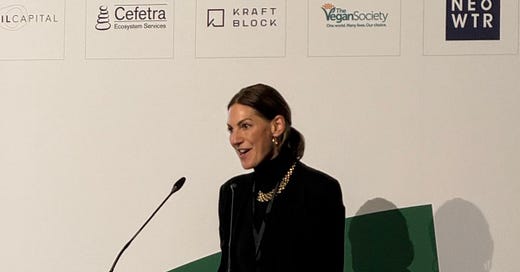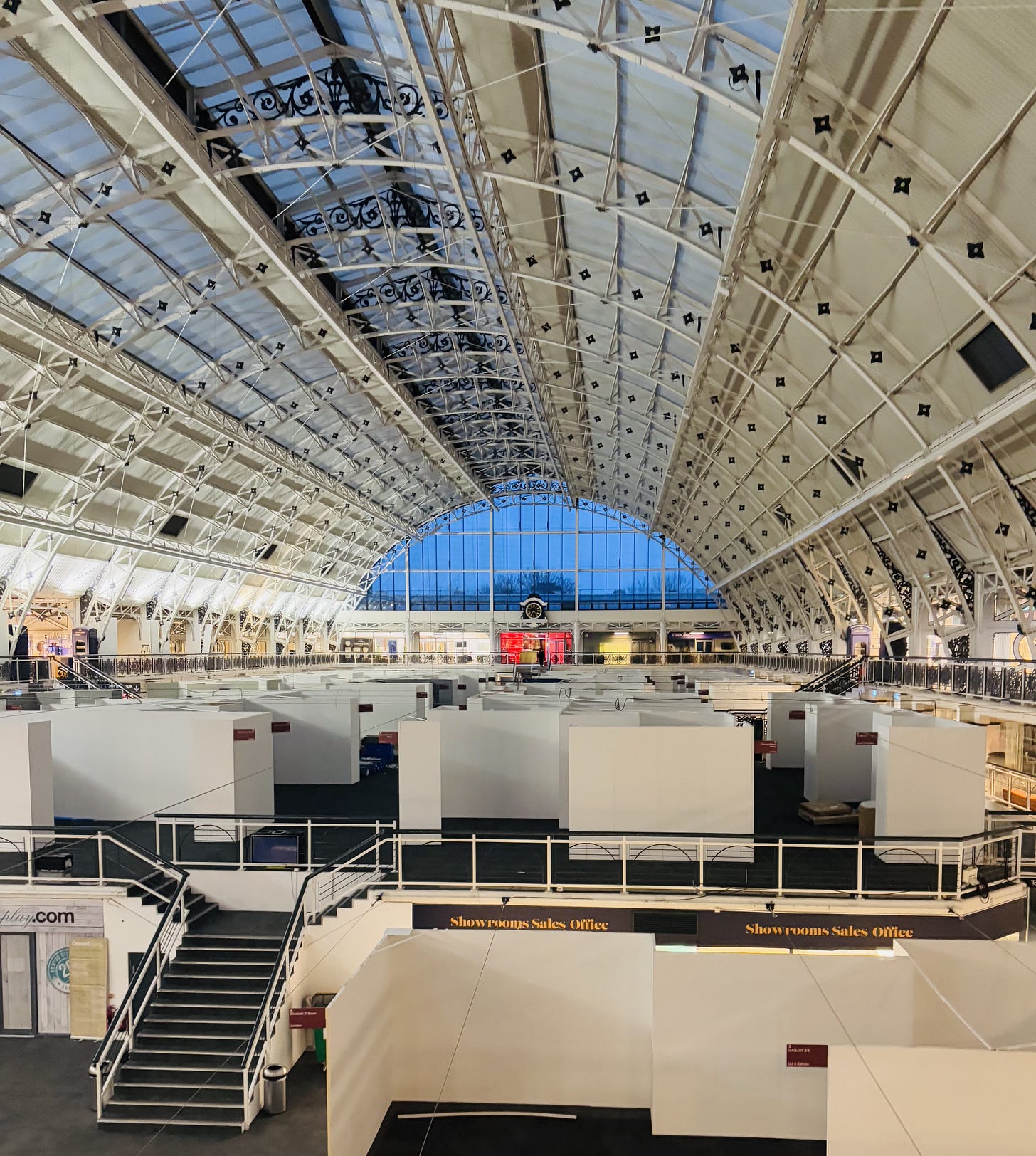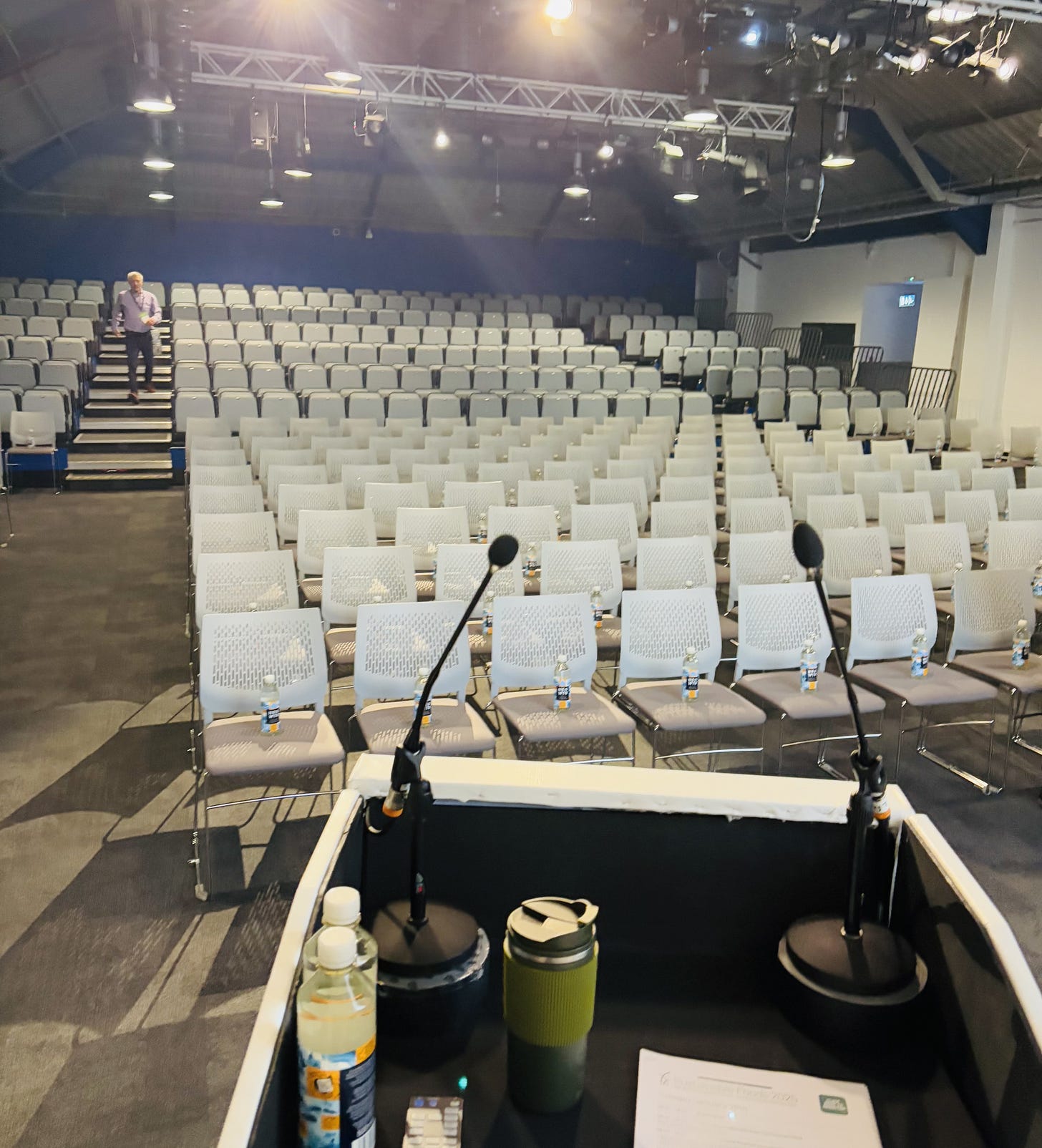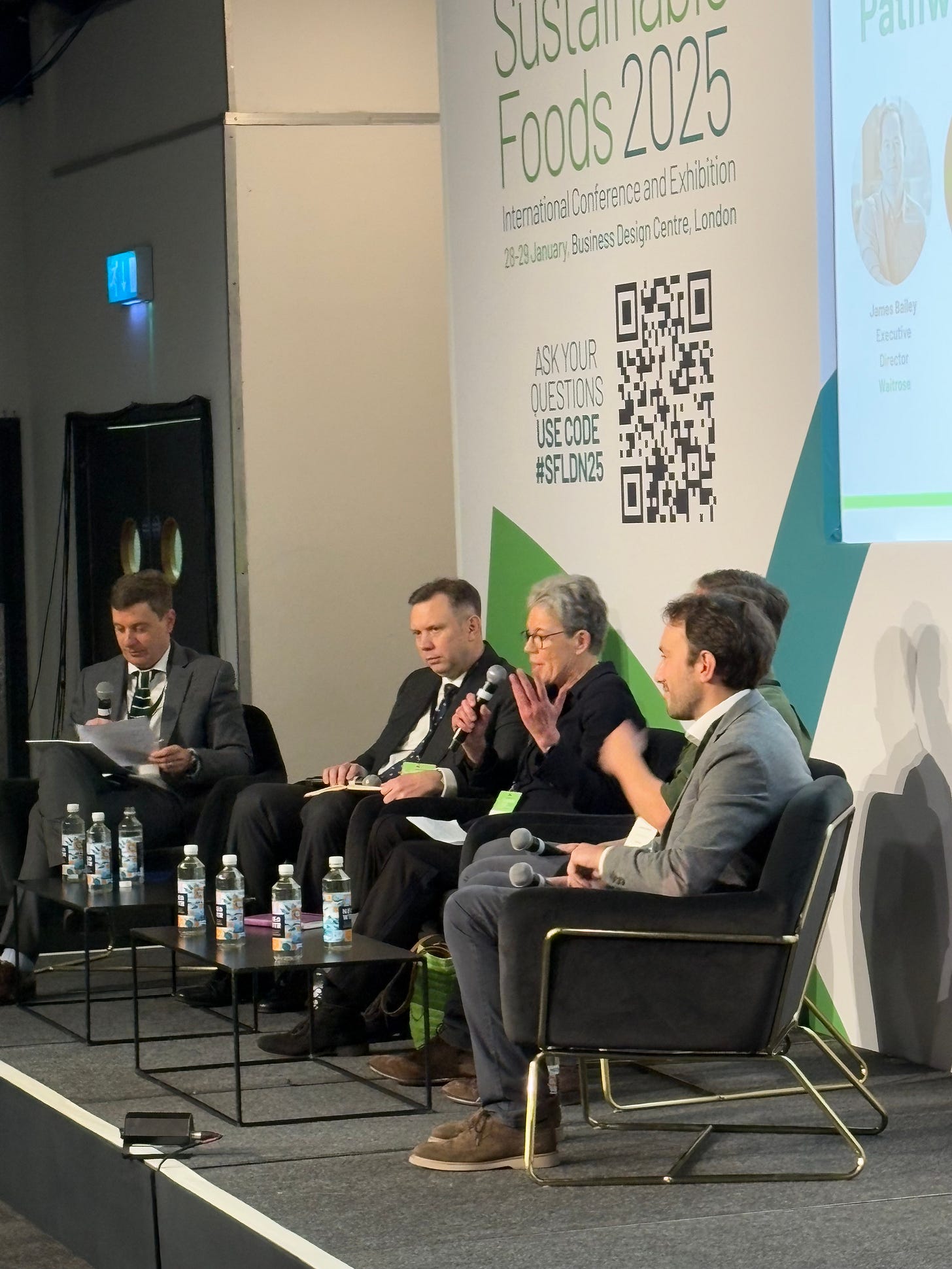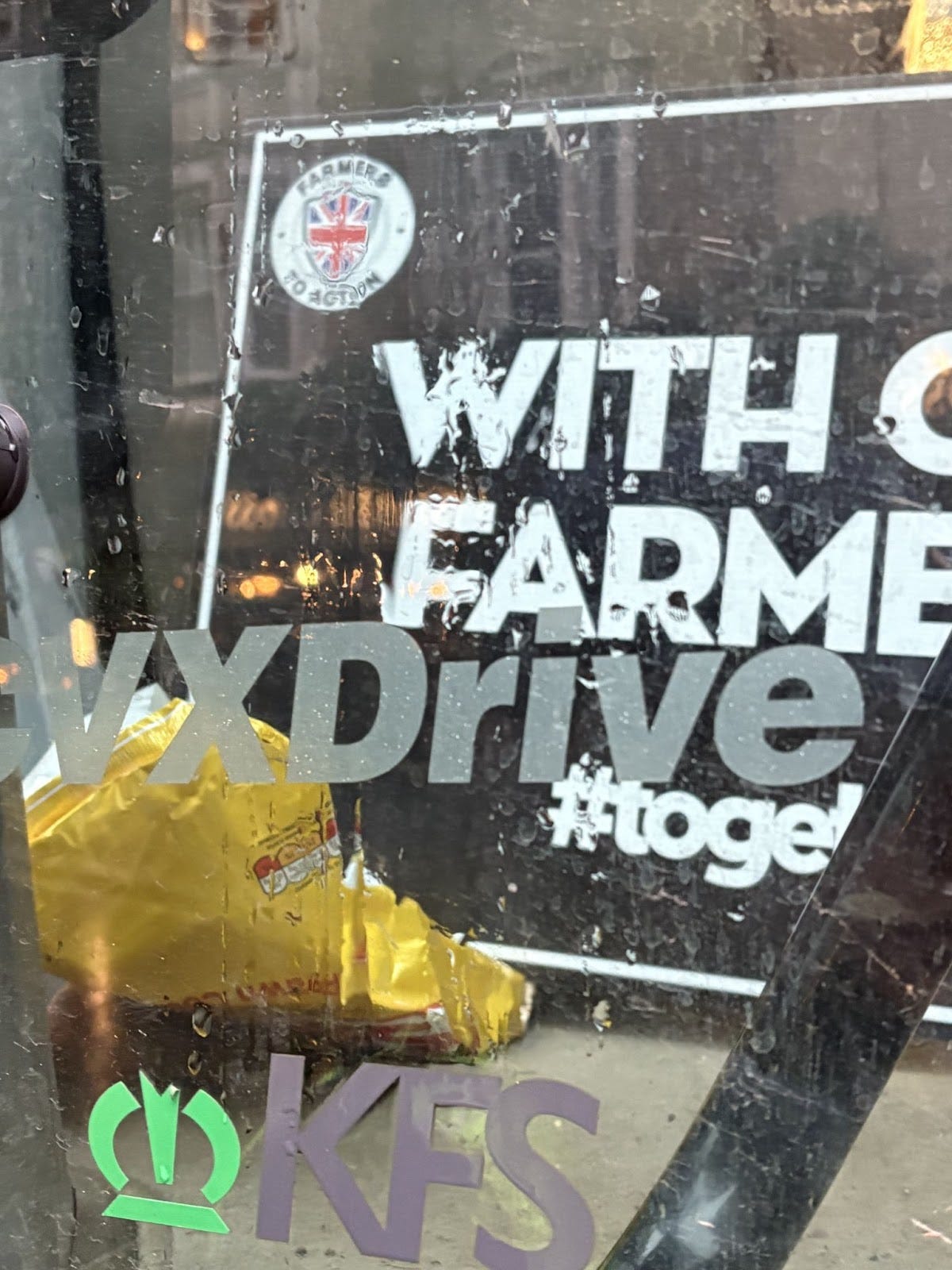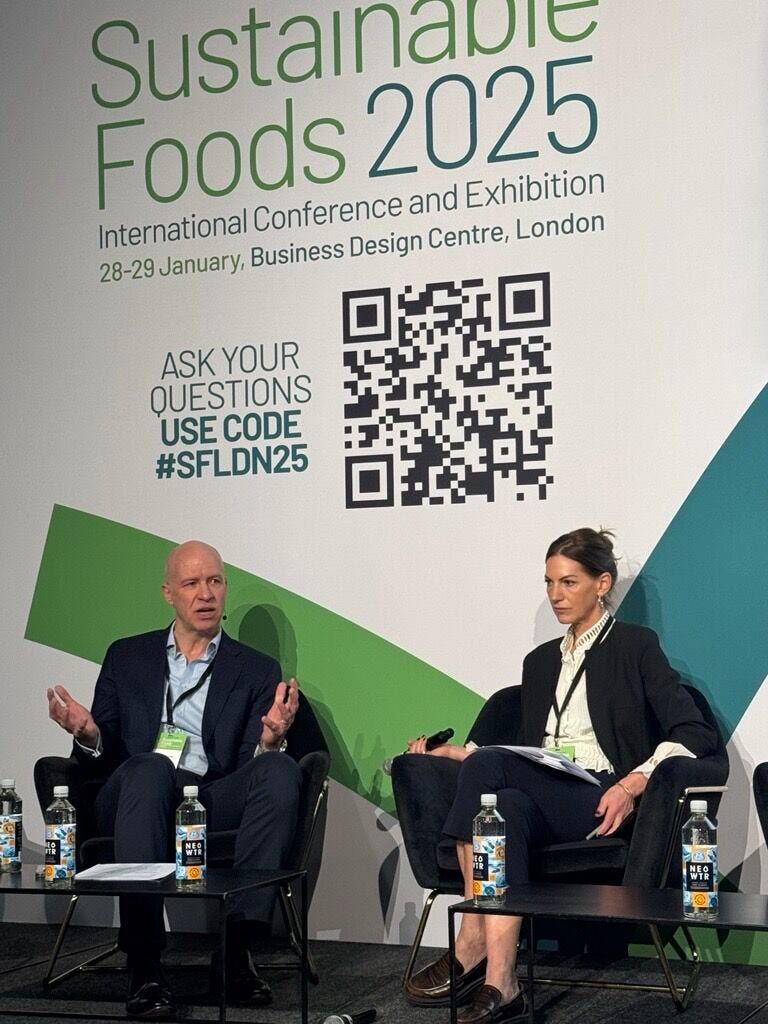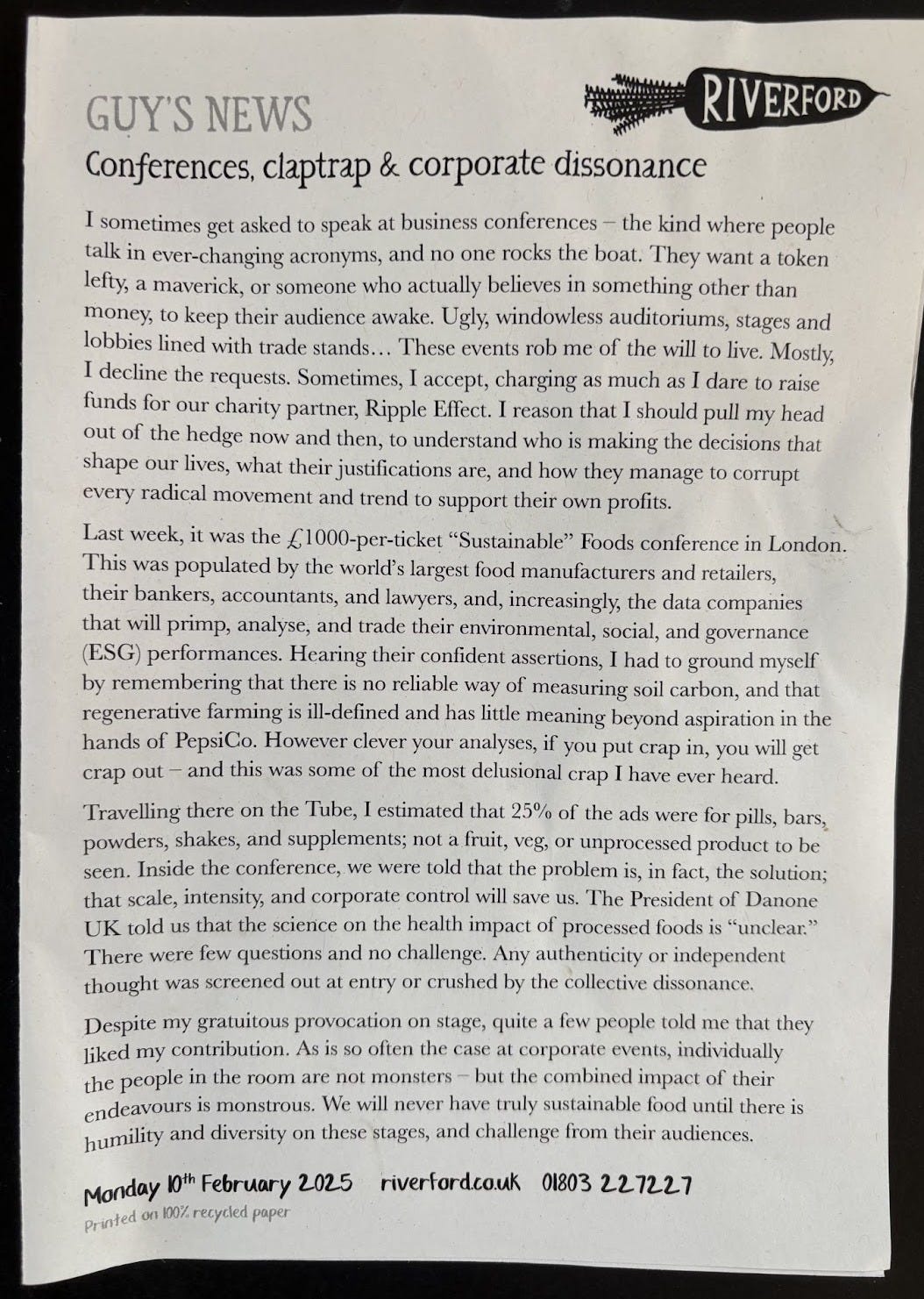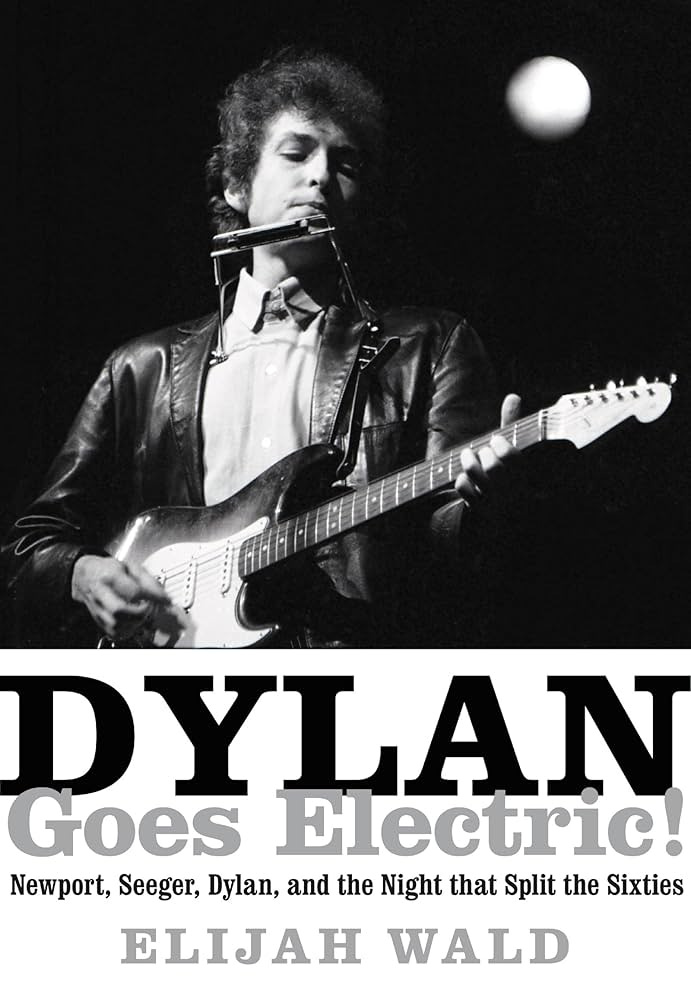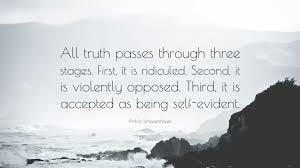And next…
The Sustainable Foods Conference
This time last month I stood in a large, windowless auditorium in front of some of the biggest names in global food. The auditorium was within a business centre which had originally been built as an Agricultural Hall. It opened in 1862 to host huge agricultural shows, attended by over 130,000 people.
Unlike the audience two hundred years ago, however, there were few farmers there. Instead there were representatives from business and politics: the people, essentially, who run our food system.
I mean, look at the names above my head.
I know.
I had been asked to be the MC and host at the two-day Sustainable Foods Conference. This made me, according to Google, the Mistress of Ceremonies. I was tempted to bring a whip. I didn’t (although turns out it might have been helpful).
My job was to open and close the conference and introduce each of the panels from 9am to 6pm every half an hour, ensuring everyone kept to time.
I have thought a lot about what to write about this conference: what happened and the conflicts I felt and participated in.
This was not because the panels weren’t excellent: they were, with knowledgeable people who had a full grasp of the challenges, the nuance and the opportunities for change on issues which ranged from sustainable sea-food and the unlocked potential of frozen food to how to fund an agro-ecological transition. I lost count of the number of times ‘regenerative farming’ was mentioned, which just would not have been the case five years ago and think is broadly a Good Thing.
Instead my equivocal feelings came from being asked a few days before to do a ‘Q&A’ with the president of a global food giant. And what happened afterwards.
I think I should start like this.
Whilst I understand where they are coming from, I do not align myself with the purists in the food and farming movement who think that big corporations - or, whilst we’re at it, politicians - are ‘BAD’. I’ve met enough of both to know there is too much nuance once you go behind the scenes to make these kinds of binary statements.
I also believe in crossing the floor; in compromise to bring about movement.
I don’t think there should be some kind of purity pyramid which enables some people to feel they can sit at the top and cast judgement on others. We are all flawed, for that is the human condition. Most of us are hypocrites in a million small and large ways, some of which we are aware of and some of which we are not. This does not mean we shouldn’t strive to be awakened so we might make better choices, but it does mean we won’t always manage to do this.
I’m also so bored of hearing sentences which begin ‘We just need…’.
We all know what we need.
Tell me how. That’s all I want to know. How do we get what we need and how do we get it in time.
I, like so many others, want the world to be fed only whole foods, home cooked, from organic small farms. I want fairness and equality. I want access to nature for all, so that there is a chance we might learn to care about it in time to save it.
But I think the prospect of overthrowing capitalism and supermarket control in time to save the health of both us and the planet - about ten to twenty years, depending on who you talk to - is unlikely. In the UK, 83% of our food is bought from supermarkets. One third of meals is eaten outside the home. For the ultimate contradiction, look for the UPF-wrappers inside most farmers’ tractor cabs as they rail against the supermarkets and chant ‘no farmers no food’.
This doesn’t mean I don’t think we should stop trying to bring about a better system. Or that holding people to account isn’t critical. Or that I don’t support protest, argument, debate and challenge.
For the ultimate example of how important whistleblowers are watch the Netflicks documentary ‘Buy Now: The Great Shopping Conspiracy’ to hear the voices of senior people at Amazon, Nike and others talk about how they now feel about being part of designing a system based around people buying what they do not need.
What I do believe, however, is that if you’re going to cross the floor you need to be sure before you walk in where your red lines lie.
I didn’t do this.
I’ve seen others do the same in both politics and business. They argue they need to keep a seat at the table to make sure there’s a dissenting voice. They said no one remembers the name of anyone who resigned, or why, as the waters close over their head and everyone moves on without them. All this is true. But it doesn’t change needing to know where your red lines lie so you do not cross them.
That day, instead asking my own questions, I was given a script. It wasn’t a Q&A nor an ‘in conversation’ as the billing described, because my part was written for me.
Not knowing how to handle it, I asked advice from friends the day before. Some said I should refuse to do it, but the good girl in me felt unable to back out the day before. One of my best friends, an economic correspondent for Channel 4 well used to grilling Secretaries of State, said otherwise.
They’re not paying you to be you: ‘Sarah Langford the barrister and farming advocate’. They’re paying you to do the job they want you to do.
So I did.
If you want to know how I felt about it, the below picture represents my expression throughout.
My face is like thunder not because I am opposed to huge businesses changing what they produce so they are better for people and the planet. Nor was I necessarily disagreeing with all that was said or believed it to be greenwashing.
It was because I felt unable to freely challenge or question anything. I felt like a corporate puppet. And like I was part of a pretence. Because this wasn’t a conversation. It certainly wasn’t a Q&A. It was a script.
For another take, read the thoughts of Guy Singh-Watson from Riverford, who sat in the audience and watched without heckling after I had pleaded with him not to (another mistake).
At the end of the second and final day, I gave the closing speech. There were only about 30 people left in the audience to hear me talk about how it felt to deliver someone else’s lines and pretend they were my own (I say this as someone who stood up in a criminal court and put my client’s case to a judge and jury for a decade).
I was talking to a friend recently about the new Bob Dylan biopic. We spoke about the parallels between the resistance the politically-motivated folk movement felt to Dylan ‘going electric’ (for which you can probably read ‘mainstream and commercial’). We talked about the parallels in the organic and regenerative farming world.
Some are fiercely resistant to a farmer-led movement being captured and watered-down by corporates. Others think it's the only realistic way to get much better food to many more people. We decided in the end that even if the latter is the right answer/what’s happening, the only way to ensure the former is to know where the red lines are and to stand firmly behind them, no matter the pressure.
Having an independent voice is a privilege. I know this. And it can be hard to hold the line whilst collaborating to bring about actions rather than intentions, which I think we need to do. It’s hard when it may cost you income you need. It’s hard to face other people’s anger. It’s hard* to get a reputation for being ‘difficult’. (It’s even harder when you have to make a moral reckoning in between trips to St Thomases’ A&E to get your 8-year old’s severed hand sewn up and file an article deadline at the same time).
Still. I also think it’s the only way to quell the knot in your stomach I felt that day.
So, be brave friends. Don’t do what I did. Know where your red lines lie and learn how to say no. Because I suspect that the more of us there are standing behind those lines, the less brave we need to be.
Sarah x
*for me, anyway

